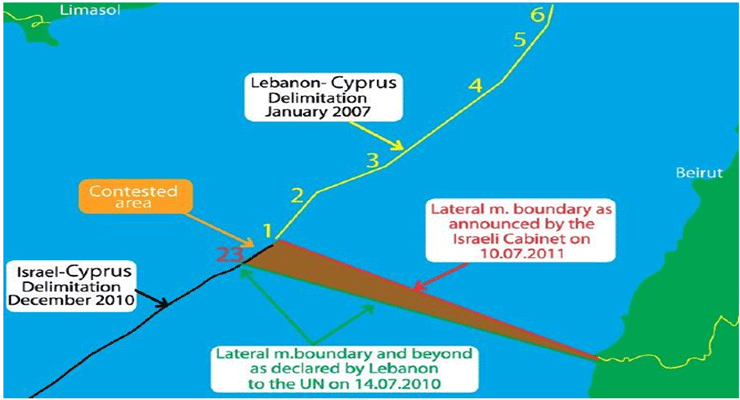Maritime border negotiations
to start second week of October
Fate of land dispute is still hanging in the air
| Share |
|

|
|

|
|
|
|
After ten years of back-and-forth, Lebanon and Israel have agreed on the terms of a framework for indirect negotiations on disputed maritime borders, according to statements by officials from both sides. The United Nations will oversee the talks which will be mediated by the United States.
Indirect talks mean that Lebanese army negotiators will not be speaking directly to members of the Israeli delegation but through UN officials.
Negotiations are to start in the week of October 12, and will be held at a UN headquarters in the border-town of Naqoura, a habitual venue in the past for three-way talks.
About 860 square kilometers in sea area is claimed by each side to be within its own exclusive economic zone. The disputed area is believed to hold commercial quantities of gas reserves. It falls inside the ‘Block 8’ and ‘Block 9’ zones.
“The two sides have asked the United States to work as a broker to demarcate the maritime borders. It’s ready to do so,” said Parliament Speaker Nabih Berri.
Berri said that land border disputes on the ‘Blue Line’ traced following the Israeli withdrawal from Lebanon in the year 2000 must also be addressed at the same time. That demand was blocking efforts to begin negotiations on the maritime borders. It wasn’t addressed by Israeli Energy Minister Yuval Steinitz in his statement on the forthcoming talks.
UNIFIL, UN’s peacekeeping force, welcomed the announcement of talks and said in a statement that it was prepared to “extend to the parties all the support at its disposal.” It said that it was also prepared to assist the two sides in solving their Blue Line land border dispute. U.S. assistant secretary of State for Near Eastern Affairs David Schenker said in a briefing that the US welcomes steps by the parties to resolve the Blue Line dispute. However, he said, the talks set to start in two weeks are “a separate track.”
The Lebanese Army will be the local negotiator while Steinitz will lead the Israeli delegation and is expected to attend some of the sessions.
US Secretary of State Mike Pompeo said that the announcement of talks was “historic” and “a vital step forward that serves the interests of Lebanon and Israel, of the region, and of the United States. Both countries requested that the United States participate as mediator and facilitator in the maritime discussions.” He credited the break of the stalemate to three years of efforts by Schenker and US diplomat David Satterfield. He also said the US “looks forward” to separate talks on the Israel-Lebanon land border.”
“We encourage both sides to take advantage of this opportunity,” Schenker said. “This is an issue that has festered for too long,” he said.
Berri said drilling in ‘Block 9’ was delayed because of the dispute and that the French oil giant Total has promised to begin exploration work before the end of the year.
Israel wants to establish a pipeline to Greece, to export gas to Europe. However, before a deal could be made it would need to agree on the boundaries of an economic exclusion zone with Cyprus and Lebanon.

Date Posted: Oct 02, 2020
| Share |
|

|
|

|
|
|
|